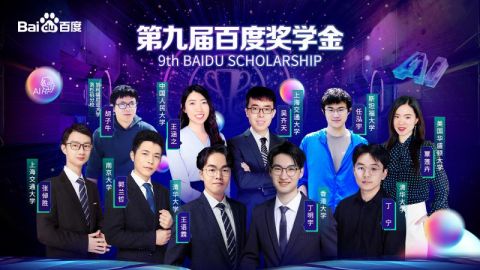On December 24, the top ten list of Baidu Scholarships for 2021 was released, and top talents from innovative fields such as algorithms, data recognition, autonomous driving, and biomedicine were awarded. Since its establishment in 2013, the Baidu Scholarship has been held for 9 consecutive years, with a total of nearly 20 million yuan invested in cultivating China’s top AI talents.

The research directions of the Baidu scholarship recipients this year are focused on algorithms, data recognition, autonomous driving, biomedicine and other innovative fields. They are: Tsinghua University Ding Ning, Shanghai Jiaotong University Wu Qitian, Stanford University Ren Hongyu, University of California, Los Angeles, Xiu Niu, and the University of Hong Kong Ding Mingyu, Qin Lianhui from Washington University, Wang Hanzhi from Renmin University of China, Wang Yulin from Tsinghua University, Zhang Zhuosheng from Shanghai Jiaotong University, and Guo Lanzhe from Nanjing University.
Baidu founder, chairman and CEO Robin Li will present awards to 10 top Chinese AI scholars at the Baidu AI Developer Conference to be held on December 27. Baidu said that in the next five years, Baidu will cultivate 5 million AI for society around eight key technologies including autonomous driving, machine translation, biological computing, deep learning framework, digital city operation, knowledge management, AI chips, and personal intelligent assistants. Talent.
Focus on the pain points of domestic AI talent training and explore new directions for the integration of teaching and research
Promote learning with competition to cultivate AI talents who can “produce results”
In addition to the exclusive training for AI teachers, Baidu also continues to increase investment for students majoring in artificial intelligence in colleges and universities to help students learn in practice and improve in innovation. Through Baidu Star, the “One Belt One Road” international big data competition, the Chinese University Computer Contest Artificial Intelligence Innovation Competition and other top domestic competitions, sufficient bonus support and practical exchange opportunities are given, and the flying oar ability is continuously improved to help students more easily Creativity landing.
In recent years, AI talents have emerged in various Baidu competitions, and the trend of younger talents has continued to spread. In the 2020 Baidu Star Competition, Chen Yifan, from the sixth grade of Lu Xun Primary School, became the youngest finalist in history. Baidu’s vision of making AI learning easier and more equal is also being realized.
In the National University Computer Competition hosted by Baidu, cases of unique social significance have emerged one after another: some normal students used the AI system to create a “Bane” for the insect pests of Panax notoginseng; and some foreign students used the flying paddle module to generate a book for the endangered languages of ethnic minorities. The “Smart Dictionary” allows the cultural history of ethnic minorities to be passed on. In addition to the competition, there are also Gansu college students who have devoted themselves to building robots for planting trees in the desert, making the desert an oasis a reality.
In the next five years, Baidu will focus on eight key technologies including autonomous driving, machine translation, biological computing, deep learning frameworks, digital city operations, knowledge management, AI chips, and personal intelligent assistants, to cultivate 5 million innovations for the society. Cross-border and open AI talents continue to explore the infinite possibilities in the field of artificial intelligence.